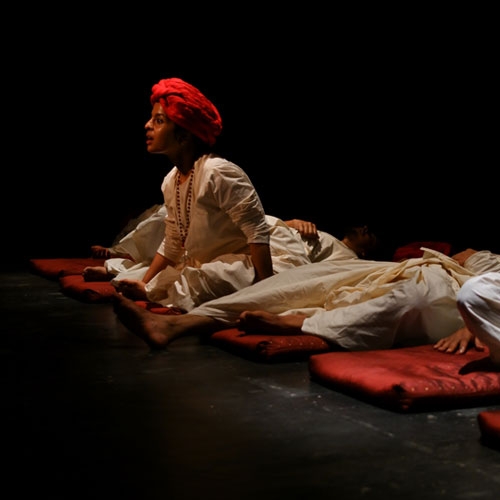

Event Info
- Language: MARWADI/HINDI/AWADHI/HARYANVI
- City / State: Delhi
- Directed By: MOHIT TAKALKAR
- Produced By: UJAAGAR DRAMATIC ASSOCIATION
HUNKARO
An intriguing weave of 3 stories talks about the strength that hope can instil and how life without hope is impossible to sustain. Out of the three powerful narratives, two are by young contemporary Rajasthani writers, Arvind Charan and Chirag Khandelwal. The third, that lays the foundation for the entire performance, is by the renowned Rajasthani writer, Vijaydan Detha.
In Detha's story, a down-on-his luck farmer from Marwar loses his wife and is left behind with two children, a piece of barren land, and a hostile stepmother. When a drought hits, the stepmother decides that they kill the children and leave for Mumbai in search of a better life. The father devises a plan where they lock up the kids with a meagre supply of food so that they will die while believing their parents would return home by evening. The wife hopes that the next year will be fruitful. The husband hopes that someone will save the kids. And the kids believe that evening will fall only when their parents have returned home. Whose hope will prevail is the question that this dark, tight and gripping narrative asks in Asha Amar Dhan.
Khandelwal's lyrical account describes Amar, who like thousands of others, takes a long walk home during the mass-migration of Covid. He has no food, no water and no money, and yet is hopeful that he will eventually be home. Enroute he meets a strange entity - half-vulture-half crow - who becomes his fellow traveller, friend, foe, and philosopher. The crow symbolises survival and the vulture is a beacon of death. Their long journey together, both literally and metaphorically, forms the essence of Giddh.
Maai by Arvind Charan is the story of two brothers, Birju and Mandu, who live with their physically challenged mother in a small chawl in suburban Mumbai. They have hopes, dreams and a mundane life to bind it all together. When lockdown is declared, they both decide to leave their mother behind and go back to their native village in Rajasthan. When they reach home, Mandu is guilt-ridden but Birju assures him that this was the right decision to take. A year later, with new dreams in their eyes, they return to Mumbai. The guilt and the relentless hope they carry is the crux of this compelling play.
ON STAGE
Bharati Perwani
Mahesh Saini
Puneet Kumar Mishra
Bhaskar Sharma
OFF STAGE
Mohit Takalkar - Director
Ajeet Singh Palawat - Group Head / Director
Ipshita Chakraborty Singh - Group Head / Director
Sahil Ahuja - Production Assitant/ Sound
Vikrant Thakar - Light Designer
Chirag Khandelwal - Ass. Director
Hakim Khan - Music
Hunkaro is a performance piece devised just after the second wave of COVID-19. There was an urgent call within my theatre company for constructing a performance as a reflection of what the world has endured. The idea of the piece came into existence with a simple yet disturbing realisation that the pandemic has reduced not only the attention span of people but also the capacity and need to listen. Since Lockdown, there is an insatiable hunger to consume visuals and noise which leaves very little to no room for listening. And if there is no listening, Hunkaro cannot exist.
But are we ready to listen? It is said that listening is an art, and just like many other art forms, is this one too losing its beauty and necessity? The world lives on hope and indeed, hope is the thread that binds this performance. The performance, while laying a strong emphasis on the beauty of Rajasthani language, does talk about the aesthetic value of languages as a whole, and importance of the uttered word as well as the art of listening. Keeping ‘psychophysical acting’ at the core of the performance, the actors are challenged to speak at the unison of the mind and body, at times expressing themselves through tone and body and sometimes in no-tone. The piece is replete with songs which come from the centuries-old Maanganiyaar tradition but avoids musical instruments, once again underlining the power of the spoken and sung word.